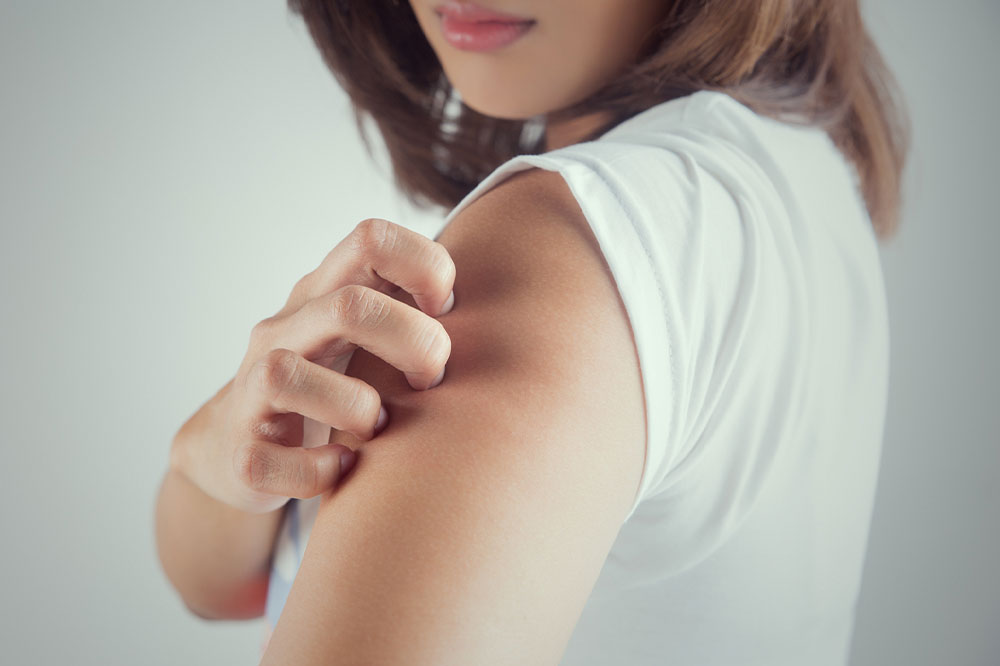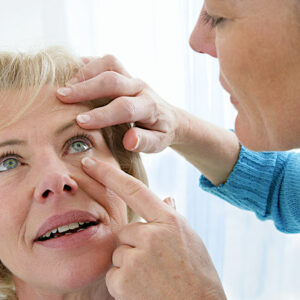Must-know Triggers of Itchy Skin

Itchy skin is characterized by an uncomfortable and irritating sensation on the skin that creates an urge to scratch. Itching in itself is not a disease but a symptom. It could be triggered by parasitic infestations, fungal infections, sunburns, insect bites, dry skin, healing wounds, or an underlying skin disease like eczema. Depending on the cause, the patient’s skin may appear puffed up, rough, irregular, bumpy, or just the same.
Skin disease
Itchiness might be a result of skin disease. Some diseases affect the skin, causing rashes, inflammation, itchiness, or other unpleasant skin changes. They may be triggered by genetic factors, a poor lifestyle, or environmental factors. Irrespective, simple home remedies can help treat skin conditions in most cases. However, if the itching persists, one should check with the dermatologist to prevent the situation from worsening.
Seborrheic dermatitis
It is a rash that starts on the scalp and spreads around the eyebrows, beard, ears, neck, and sometimes around the chest. In rare cases, it also appears under the nostrils. The rash looks pink or purple and makes the affected area lighter than the surrounding skin. Seborrheic dermatitis causes the skin to become very itchy and inflamed.
Chickenpox
Chickenpox is a highly contagious disease caused by a virus. It starts as a rash and then turns into itchy, fluid-filled blisters. The rash commonly appears on the face, chest, and back and then spreads throughout the body. Once the rash turns into blisters, it causes aggravated itching around the affected areas. After a few days, the blisters heal and form scabs. Chickenpox mainly affects children and can be managed with simple home remedies and mild treatments.
Ringworm
This is a skin infection caused by fungus. Ringworms can appear anywhere on the body and are intensely itchy and painful. Affected people develop ring-shaped rashes with raised, worm-shaped borders. Other signs include darkening of the skin and scaly patches.
Hives
Hives cause bumps or raised patches or both on the skin. These bumps and raised patches appear suddenly, are itchy, and may be inflamed. Several factors, including foods, environmental irritants, and specific treatments, could trigger them.
Allergies
Allergies and skin reactions are common health concerns. If a person mistakenly eats or smells something they are allergic to, it might lead to several symptoms, including irritated skin. In worse cases, it can lead to skin reactions that need to be reviewed by a doctor immediately. A common form of allergic reaction is an IgE-mediated food allergy, with signs like tingling or itching in the mouth and a raised, itchy red rash (hives). Sometimes, the skin turns itchy and red without a raised rash.
Parasitic infestations
Parasites are tiny living organisms that use other living things, like the human body, as hosts for food and a place to live. Parasitic infestations are caused due to contaminated food or water, a bug bite, or sexual contact. Some common examples are giardia infections (caused by contaminated water supply), toxoplasmosis (transmitted by cats), and malaria (caused by the bite of the female Anopheles mosquito). Some of these can be cured using simple home remedies, while others might require consulting a doctor.
Insect bites and stings
Humans come into contact with many living organisms every day. Some are friendly, while others are not. The bites and stings of specific insects and organisms can lead to skin infections, resulting in itchy skin. When an insect bites, it releases and leaves its saliva on the skin, which causes redness, irritation, and itchiness around the site. Some bites and stings are also venomous and can result in swollen and itchy skin and a red mark (a weal) at the affected area. The severity depends upon the type of insect and the one’s skin sensitivity level. Bites of bedbugs, mosquitoes, spiders, and flies can cause itchy skin; hence, one must always maintain a distance from them!
Fungal infections
A fungal infection, also called mycosis, can affect anyone and appear on different body parts. Some common examples are athlete’s foot, jock itch, ringworm, thrush, and vaginal yeast infections. Nearly all of these result in itchy skin but can be managed easily.
Hormonal changes
The unusual itching that occurs during pregnancy is mainly a result of hormonal changes in the body. Moreover, as the fetus grows, the abdomen’s skin is stretched, which also results in itchy skin. The same is the case with women going through menopause. When experiencing menopause, the body produces much lesser estrogen, resulting in lower production of collagen and natural oils, which causes dry and itchy skin.
Systematic conditions
Itchiness can also arise when one does not follow a well-balanced meal plan, a good sleep schedule, or when one’s internal organs are in poor condition due to harmful lifestyle practices. These habits can lead to systematic health conditions that affect the entire body instead of specific parts. Examples include high blood pressure and arthritic swelling.
Poor self-hygiene
One might be the healthiest person on the inside, but not maintaining basic personal hygiene might lead to skin diseases sooner or later. The list includes conditions like dandruff and eczema, which cause itchy skin on the scalp and body. Maintaining personal hygiene is not as challenging as it appears. A few tips include bathing regularly, washing hands, and wearing clean clothes. These practices can help avoid itchy skin and other skin diseases.
As is evident, itchy skin can be caused by various reasons. While triggers like allergies are avoidable, specific skin diseases are hard to prevent. Irrespective, individuals must take steps to maintain skin health. One can follow a healthy lifestyle and visit a doctor or another professional to learn more about healthy practices to achieve better skin and overall health in the long run.











